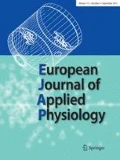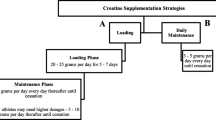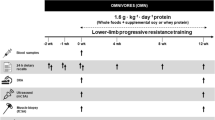Abstract
The aim of this study was to compare the effects of drinking two carbohydrate (CHO) electrolyte solutions and water on marathon running performance. Seven endurance-trained runners completed three 42.2-km treadmill time-trials which were randomly assigned and 4 weeks apart. On each occasion the subjects ingested 3 ml · Kg−1 body weight of either water (W), a 6.9% CHO solution (O) or a 5.5% CHO solution (L) immediately prior to the start of the run and 2 ml · kg−1 body weight every 5 km thereafter. The total volume of fluid ingested [mean (SEM)] was 1112 (42), 1116 (44) and 1100 (44) ml, respectively. Running times for W, O and L trials were 193.9 (5.0), 192.4 (3.3) and 190.0 (3.9) min, respectively. Performance time for the L trial was faster (P < 0.05) compared with that of the W trial. Running speed was maintained in the L trial, whereas it decreased after 10 km (P < 0.05) in the W and after 25 km (P < 0.05) in the O trial. Blood glucose and lactate, and hormonal responses to fluid ingestion were similar in all three trials. Higher plasma free fatty acid and glycerol concentrations were observed at the end of the W trial compared with those obtained after the O and L trials, respectively (P < 0.05). Plasma ammonia concentration was higher (P < 0.01) at the end of the L trial compared with the W trial. Plasma creatine kinase concentration was higher (P < 0.05) 24 h after the completion of the L trial than after the W trial. This study shows that the ingestion of a 5.5% CHO solution improves marathon running performance.
Similar content being viewed by others
References
Apple FS, Rogers MA, Casal DC, Sherman WM, Ivy JL (1985) Creatine kinase-MB isoenzyme adaptations in stressed human skeletal muscle of marathon runners J Appl Physiol 59: 149–153
Bergstrom J, Hermansen L, Hultman E, Saltin B (1967) Diet, muscle glycogen and physical performance. Acta Physiol Scand 71: 140–150
Bjorkman O, Sahlin K, Hagenfeldt L, Wahren J (1984) Influence of glucose and fructose ingestion on the capacity for long-term exercise in well-trained men. Clin Physiol 4: 483–494
Borg GAV (1973) Perceived exertion: a note on “history” and methods. Med Sci Sports Exerc 5: 90–93
Christensen EH, Hansen O (1939) Arbeitsfahigkeit und Ehrnahrung, Skand Arch Physiol 81: 160–175
Chromy V, Gergel J, Voznicek J, Krobholzova L, Musil J (1977) Assay of serum free fatty acids by extraction, photometric procedures. Clin Chim Acta 80: 327–332
Coyle EF, Montain SJ (1992) Benefits of fluid replacement with carbohydrate during exercise. Med Sci Sports Exere 24: 5324–5330
Coyle EF, Hagberg JM, Hurley BF, Martin WH, Ehsani AA, Holloszy JO (1983) Carbohydrate feeding during prolonged strenuous exercise can delay fatigue. J Appl Physiol 55: 230–235
Coyle EF, Coggan AR, Hemmert MK, Ivy JL (1986) Muscle glycogen utilisation during prolonged strenuous exercise when fed carbohydrate. J Appl Physiol 61: 165–172
Coyle EF, Hamilton MT, Alonso JG, Montain SJ, Ivy JL (1991) Carbohydrate etabolism during intense exercise when hyperglycemic. J Appl Physiol 70: 883–840
Fielding RA, Costill DL, Fink WJ, King DS, Hargreaves M, Kovaleski JE (1985) Effect of carbohydrate feeding frequencies and dosage on muscle glycogen use during exercise. Med Sci Sports Exerc 17: 472–476
Forster CD, Taylor JY, Macdonald IA (1991) The assay of the catecholamine content of small volumes of human plasma. In: Rollema H, Westerink B; Drifjhout WJ (ed). Monitoring molecules in neuroscience. Conference on in vivo methods. □ 173–175
Hamilton MT, Gonzalez-Alonso J, Montain J, Coyle EF (1991) Fluid replacement and glucose infusion during exercise prevent cardiovascular drift. J Appl Physiol 71: 871–877
Hargreaves M, Costill DL, Coggan A, Fink WJ, Nishibata I (1984) Effect of carbohydrate feedings on muscle glycogen utilization and exercise performance. Med Sci Sports Exerc 16: 219–222
Hellsten-Westing Y, Sollevi A, Sjodin B (1991) Plasma accumulation of hypoxanthine, uric acid and creatine kinase following exhausting runs of differing durations in man. Eur J Appl Physiol 62: 380–384
Hermansen L, Hultman E, Saltin B (1967) Muscle glycogen during prolonged severe exercise. Acta Physiol Scand 71: 129–139
Houmard JA, Egan PC, Johns RA, Neufer PD, Chenier TC, Israel RG (1991) Gastric emptying during I h of cycling and running at 75%VO2max 2max. Med Sci Sports Exerc 23: 320–325
Karlsson J, Saltin B (1971) Diet, muscle glycogen, and endurance performance. J Appl Physiol 31: 203–206
Lamb DR, Brodowicz GR (1986) Optimal use of fluids of varying formulations to minimise exercise-induced disturbances in homeostasis. Sports Med 3: 247–274
Laurell S, Tibbling G (1966) An enzymatic fluorometric micromethod for the determination of glycerol. Clin Chim Acta 13: 312–316
Maughan RJ, Leiper JB, Thompson J (1985) Rectal temperature after marathon running. Brit J Sports Med 19: 192–196
Maughan RJ, Fenn CE, Leiper JB (1989) Effects of fluid, electrolyte and substrate ingestion on endurance capacity. Eur J Appl Physiol 58: 481–486
Mitchell JB, Costill DL, Houmard JA, Fink WJ, Robergs RA, Davis JA (1989) Gastric emptying: influence of prolonged exercise and carbohydrate concentration. Med Sci Sports Exerc 21: 269–274
Murray R, Paul GL, Seifert JG, Eddy DE (1991) Responses to varying rates of carbohydrate ingestion during exercise. Med Sci Sports Exerc 23: 713–718
Myhre LG, Hartung GH, Nunneley SA, Tucker DM (1985) Plasma volume changes in middle-aged male and female subjects during marathon running. J Appl Physiol 59: 559–563
Noakes TD (1987) Effect of exercise on serum enzyme activities in humans. Sports Med 4: 245–267
Noakes TD, Adams BA, Myburgh KH, Greef C, Lotz T, Nathan M (1988) The danger of an inadequate water intake during prolonged exercise. Eur J Appl Physiol 57: 210–219
Noakes TD, Myburgh KH, Plessis JD, Lang L, Lambert M, Van Der Riet C, Schalll R (1991) Metabolic rate, not percent dehydration, predicts rectal temperature in marathon runners. med Sci Sports Exerc 23: 443–449
Paul AA, Southgate DAT (1978) McCance and Widdowson; the composition of foods. HMSO, London
Pugh LGCE, Corbett JL, Johnson RH (1967) Rectal temperatures, weight losses, and sweat rates in marathon running. J Appl Physiol 23: 347–352
Rogers MA, Stull GA, Apple FS (1985) Creatine kinase isoenzyme activities in men and women following a marathon race. Med Sci Sports Exerc 17: 679–682
Romijn JA, Coyle EF, Sidossis L, Gastaldelli A, Horowitz JF, Endert E, Wolfe RR (1993) Regulation of endogenous fat and carbohydrate metabolism in relation to exercise intensity and duration. Am J Physiol 265: E380-E391
Sherman WM, Costill DL, Fink WJ, Miller JM (1981) Effect of exercise and diet manipulation on muscle glycogen and its subsequent utilization during performance. Int J Sports Med 2: 114–118
Sherman WM, Costill DL, Fink WJ, Hagerman FC, Armstrong LE, Murray TF (1983) Effect of 42.2 km footrace and subsequent rest or exercise on muscle glycogen and enzymes. J Appl Physiol 55: 1219–1224
Soeldner J, Sloane D (1965) Critical variables in the radioimmunoassay of serum insulin using the double antibody technique. Diabetes 14: 771–779
Taylor HR, Buskirk ER, Henschell A (1955) Maximum oxygen uptake as an objective measure of cardio-respiratory performance. J Appl Physiol 8: 73–80
Tsintzas OK, Liu R, Williams C, Campbell IG, Gaitanos GC (1993a) The effect of carbohydrate ingestion during exercise on a 30-km race. Int J Sports Nutr 3: 127–139
Tsintzas OK, Williams C, Wilson W (1993b) Influence of carbohydrate ingestion on muscle glycogen utilisation during prolonged running in man. J Physiol 467: 72P
Williams C, Nute MG, Broadbank L, Vinall S (1990) Influence of fluid intake on endurance running performance. Eur J Appl Physiol 60: 112–119
Wright DA, Sherman WM, Dernbach AR (1991) Carbohydrate feedings before, during, or in combination improve cycling endurance performance. J Appl Physiol 7: 1082–1088
Author information
Authors and Affiliations
Rights and permissions
About this article
Cite this article
Tsintzas, O.K., Williams, C., Singh, R. et al. Influence of carbohydrate-electrolyte drinks on marathon running performance. Eur J Appl Physiol 70, 154–160 (1995). https://doi.org/10.1007/BF00361543
Accepted:
Issue Date:
DOI: https://doi.org/10.1007/BF00361543




